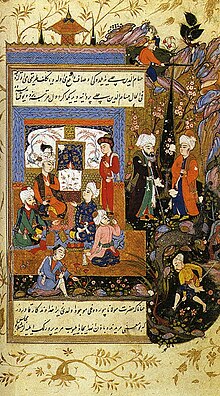6 Rumi Books Every Book Lover Should Read
By Trishi Dhingra
Updated - Sept. 30, 20214 min read
A 13th-century Sufi mystic, Islamic scholar, and poet, Jalal al-Din Muhammad Rumi, was a free spirit whose unique personality and influence transcend time, social class, background and religion. He not only refused to follow outdated dogmatic thinking and cultural taboos, he also disapproved of the slave mentality.
It's 800 years later and we still find solace in Rumi's message of courage and spirituality. His writings have been translated into many languages and have sold millions of copies around the world. Needless to say, he is more popular now than ever. In fact, a 2014 BBC article named him the best-selling poet in the United States.
But if you're just starting with Rumi, here's a list of the 6 best Rumi books you can read and buy online.
1. The Book of Rumi: 105 Stories & Fables
Interpreted by Maryam Mafi, this Rumi book is full of distinctive and timeless Sufi lessons that are still relevant in the 21st century. It's a translation of 105 short teaching stories by Rumi, which form the core of the six-volume Masnavi and explores the hidden spiritual aspects of his everyday experiences. To the reader's benefit, the book flawlessly captures the playful and authoritative style of Rumi's writing along with the sense of suspense and drama that mark the essence of the Masnavi.
Buy from Amazon for ₹253
Also read: 10 Ruski Bon Bestsellers Everyone Should Read
2. Love is a Stranger
"Love is a stranger and speaks a strange language", wrote Rumi in his classic text about the love that observes separation and longing, intoxication and bliss, union and transcendence in the most magical way possible. This Rumi book not only speaks volumes about true love and its mystical nature, it also paints a picture of extremities that follow.
Buy from Flipkart for ₹532
Image Courtesy: Flipkart
best-rumi-books'});" data-type="blog_content_link" target="_blank" onclick="sendEvent('web_' + window.pageName, 'click_blog_content_link', 'best-rumi-books' , {'link': this.href});" href="https://magicpin.in/Flipkart-offers/3/?utm_medium=blog&utm_source=best-rumi-books">
Buy Flipkart Gift Card worth ₹100 & save BIG with magicpin!

3. The Soul of Rumi
Exploring silence, emptiness, play, God, peace, grief, sexuality, and music, here are some Rumi lessons from Coleman Barks' point of view. This Rumi book mainly focuses on the ecstatic experience of human and divine love, and their inseparability, as conveyed by Rumi 800 years ago. What's remarkable is, the author manages to capture the signature passion, daring, and insights into the human heart and the heart's longings as Rumi did.
Buy from Flipkart for ₹525
Also read: 10 Amazing Books By Salman Rushdie That Are All About Puns & Magic Realism
4. The Illuminated Rumi
The Illuminated Rumi is a revolutionary collaboration that interweaves Coleman Barks' wise and witty commentary, together with Michael Green's new and visually stunning compilation of typography, original art, old masters, photographs, and prints with sacred images from around the world. It's a magnificent meeting of ancient tradition and modern interpretation that uniquely captures the spiritual wealth of Rumi's teachings.
Buy from Flipkart for ₹2,731
5. Rumi: Bridge to the Soul
Let Rumi's poetry and his unlikely, supremely passionate ambassador, Coleman Barks carry you to the place that unites conscious knowing with a deeper, more soulful understanding. It's a beautiful edition that elucidates how Rumi himself is a "soul bridge" that crosses cultures and religions by bringing us all together through the medium of his words.
Buy from Amazon for ₹465
6. The Essential Rumi
Brimming with Rumi's ecstatic poetic essence, this book by Coleman Barks and John Moyne is a collection of 81 never-been-published-before Rumi poems that will bring light back to your life. Read this on the days when you feel alone and lost.
Buy from Amazon for ₹299



